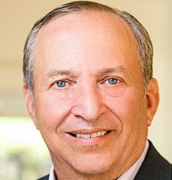[I am happy to turn this space over to my former colleague and (I trust) lifelong friend Romans Pancs, who offers what he describes as
a polemical essay. It has no references and no confidence intervals. It has question marks. It makes a narrow point and does not weigh pros and cons. It is an input to a debate, not a divine revelation or a scientific truth.
I might quibble a bit — I’m not sure there’s such a thing as a contribution to a debate that nobody seems to be having. I’d prefer to see this as an invitation to start a thoughtful and reasoned debate that rises above the level of “this policy confers big benefits; therefore there’s no need to reckon with the costs before adopting it”. That invitation is unequivocally welcome. ]
| —SL |
The Main Argument
It is a crime against humanity for governments to stop a capitalist economy. It is a crime against those whom the economic recession will hit the hardest: those employed in the informal sector, those working hourly customer service jobs (e.g., cleaners, hairdressers, masseurs, music teachers, and waiters), the young, the old who may not have the luxury of another year on the planet to sit out this year (and then the subsequent recession) instead of living. It is a crime against those (e.g., teachers and cinema ushers) whose jobs will be replaced by technology a little faster than they had been preparing for. It is a crime against the old in whose name the society that they spent decades building is being dismantled, and in whose name the children and the grandchildren they spent lifetimes nourishing are subjected to discretionary deprivation. Most importantly, it is a crime against the values of Western democracies: commitment to freedoms, which transcend national borders, and commitment to economic prosperity as a solution to the many ills that had been plaguing civilisations for millennia.
Capitalism and democracy are impersonal mechanisms for resolving interpersonal (aka ethical) trade-offs. How these trade-offs are resolved responds to individual tastes, with no single individual acting as a dictator. Governments have neither sufficient information, nor goodwill, nor the requisite commitment power, nor the moral mandate to resolve these tradeoffs unilaterally. Before converting an economy into a planned economy and trying their hand at the game that Soviets had decades to master (and eventually lost) but Western governments have been justly constrained to avoid, Western governments ought to listen to what past market and democratic preferences reveal about what people actually want.
People want quality adjusted life years (QALY). People pay for QALY by purchasing gym subscriptions while smoking and for safety features in their cars while driving recklessly. Governments want sexy headlines and money to buy sexy headlines. Experts want to show off their craft. But people still want QALY, which means kids do not want to spend a year hungry and confined in a stuffy apartment with depressed and underemployed parents; which means the old want to continue socialising with their friends and, through the windows of their living rooms, watch the life continue instead of reliving the WWII; which means the middle-aged are willing to bet on retaining the dignity of keeping their jobs and taking care of their families against the 2% chance of dying from the virus.
Suppose 1% of the US population die from the virus. Suppose the value of life is 10 million USD, which is the number used by the US Department of Transportation. The US population is 330 million. The value of the induced 3.3 million deaths then is 33 trillion USD. With the US yearly GDP at 22 trillion, the value of these deaths is about a year and a half of lost income. Seemingly, the country should be willing to accept a 1.5 year-long shutdown in return for saving 1% of its citizens.
The above argument has three problems that overstate the attraction of the shutdown:
- The argument is based on the implicit and the unrealistic assumption that the economy will reinvent itself in the image of the productive capitalist economy that it was before the complete shutdown, and will do so as soon as the shutdown has been lifted.
- The argument neglects the fact that the virus disproportionately hits the old, who have fewer and less healthy years left to live.
- The argument neglects the fact that shutting down an economy costs lives. The months of the shutdown are lost months of life. Spending a year in a shutdown robs an American of a year out of the 80 years that he can be expected to live. This is a 1/80=%1.25 mortality rate, which the society pays in exchange for averting the 1% mortality rate from coronavirus.
It is hard to believe that individuals would be willing to stop the world and get off in order to avert a 1% death rate. Individuals naturally engage in risky activities such as driving, working (and suffering on-the-job accidents), and, more importantly, breathing. Allegedly, 200,000 Americans die from pollution every year. Halting an economy for a year would save all those people. Stopping the economy for 15 years would be even better, and save all the lives that coronavirus would take. Indeed, stopping the economy is a gift that keeps giving, every year, while coronavirus deaths can be averted only once. Yet, with the exception of some climate change fundamentalists, there were no calls for stopping the economy before the pandemic.
The economy shutdown due to coronavirus seems to be motivated by the same lack of faith in progress and society’s ability to mobilise to find technological solutions (if not for this strain of the virus then for the future ones), and by the Catholic belief in the virtue of self-flagellation of the kind sported by climate-change fundamentalists of Greta’s persuasion. This lack of faith is not wholly the responsibility of governments and is shared by the citizens.
















